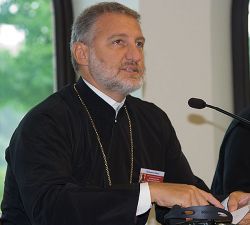Lecture by metropolitan Elpidophoros of Bursa
XIX International Ecumenical Conference
on Orthodox spirituality
If we claim to retain the sacrament of the altar, we cannot forgo or forget the sacrament of the neighbor – a fundamental condition for realizing God's Word
Bose, 10 September 2011
on Orthodox spirituality
Bose, Wednesday 7 - Saturday 10 September 2011
in collaboration with the Orthodox Churches
SACRED SCRIPTURE
AND ORTHODOX SPIRITUALITY
Allow me, first of all, to note that for a long time the opinion prevailed among theological circles and beyond that the study of Sacred Scripture was not synonymous with spirituality. And conversely: that spirituality does not spring from the study of Holy Scripture, but from frequent participation in the sacred services of worship, from monastic asceticism, from noetic prayer, and so forth.
Yet, since these biases have long been rejected both in the East and in the West (1), I would like to take this opportunity to congratulate the organizers for the successful combination of these two important elements, namely spirituality and Scripture, and proceed with the exposition of my subject.
From the outset and by way of introduction, I wish to state categorically that there can be no true or authentic Orthodox spirituality and way of life that is not based upon and inspired by Holy Scripture. Without any doubt, Holy Scripture serves as the source, beginning and foundation of that which is called Orthodox spirituality. Orthodox spirituality does not merely consist of beautiful ideas, sublime thoughts and pleasant reflections; rather, it is a balanced and authentic ecclesial ethos, a pure life style, an upright manner, a precise attitude and way of life (2).
The phrase “Sacred Scripture” (?γ?α Γραφ?) is the most convenient, familiar and preferred terminology adopted in the Orthodox Eastern Church, in contrast to the term “Bible.“ Holy Scripture comprises the totality of the known and inspired books of the Old and the New Testaments (3). The fifty books of the Old Testament are separated into historical, poetical, instructional and prophetical. The twenty-seven books of the New Testament are separated into historical, instructional and prophetical or apocalyptic.
The Apostle Paul refers to “holy scriptures“(4) and "sacred writings;“(5) he also observes: "All Scripture is given by inspiration of God, and is profitable for doctrine, for reproof, for correction, for instruction in righteousness, that the man of God may be complete, thoroughly equipped for every good work."(6) Inspired by God, Holy Scripture is also trustworthy, remarkable, memorable and certainly most worthy of study. Holy Scripture does not contain falsehoods, vaguenesses, untruths and “gray areas,“ as we would say today. It approaches and appeals to each one of us in a simple manner in order to deposit the great truths and mysteries of God. Moreover, Holy Scripture is authentic, containing an abundance of the grace of the Holy Spirit that safeguards her authors from whatever inauthentic rendition of divine revelation.
